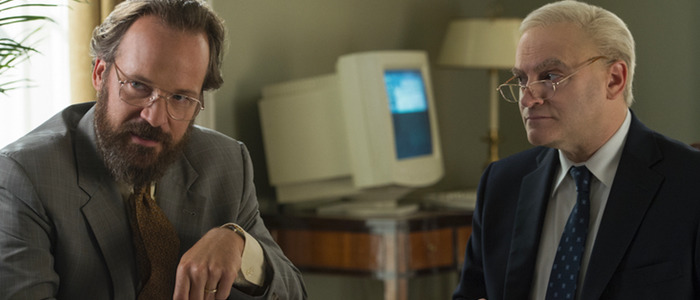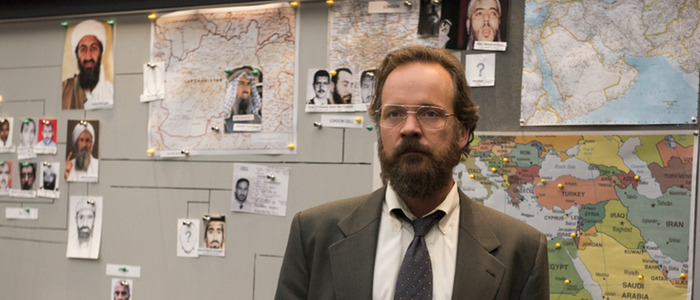'The Looming Tower' Review: The First Truly Great TV Series Of 2018
Before The Looming Tower even begins, you know where it's going to end. Yet that doesn't make the series any less engrossing, or addictive.
Based on Lawrence Wright's Pulitzer-winning book, The Looming Tower is the story of how we ended up here – seemingly trapped in wars with no end in sight. It is the story of the individuals who tried, and failed, to prevent the events that would ultimately lead to 9/11. And it unfolds with all the heart-pounding intensity of a potboiler thriller. The end result is something that may ultimately prove to be the first truly great new TV series of 2018.
The Story
Across its first three episodes, The Looming Tower unfolds like one of the best ticking-clock narratives you're likely to see. The pace of this show is relentless, and its a pace matched beat for beat by the actors. The characters here don't so much speak their lines as they do spit them. There are two warring factions at the heart of The Looming Tower: the FBI and the CIA. The FBI faction is represented by John O'Neill (Jeff Daniels), a hard-drinking vulgarian who has a wife and kids at home, and seemingly a mistress in every single city he shows up in. The CIA, in sharp contrast, are lead by the cold, calculated Martin Schmidt (Peter Sarsgaard), a man who has no intention of sharing his intel with the FBI, thank you very much.
O'Neill and Schmidt have vastly different approaches to how they deal with the growing threat of Osama bin Laden and al-Qaeda. O'Neill is a firm believer in treating al-Qaeda like criminals: he wants to arrest them and bring them to trial. Schmidt wants them treated like enemy combatants; as far as he sees it, the battle against al-Qaeda is war. The Looming Tower doesn't exactly pick sides here, but one gets the prevailing sense that Daniels' O'Neill is the more level-headed of these two men – he runs the investigation and hunt for al-Qaeda operatives like a cop trying to bust a perp. Schmidt would rather order bomb strikes, with zero regard for civilian casualties.
O'Neill and Schmidt have been going at this for a long time. New to it all is Ali Soufan (Tahar Rahim), a Lebanese immigrant rising in the ranks of O'Neill's team. Soufan is a Muslim, and the character often finds himself outraged at both the way his religion is demonized and also at how terrorists twist that same religion to suit their cause.
Thrown into the mix are weary FBI operative Robert Chesney, played by always-fantastic character actor Bill Camp; White House counter-terrorism chief Richard Clarke, played with a quiet, almost melancholy dignity by Michael Stuhlbarg; and cigar-chomping CIA director George Tenet, played by Alec Baldwin with his usual bluster and bravado.
Hindsight may be 20/20, but part of the anxiety-inducing thrills of The Looming Tower rest in how righteous the characters think they are. While Skarsgaard's Schmidt may seem like an absolute creep, there's also a real sense that he truly believes in what he's doing. That's the case with everyone here – even as they're ordering bomb strikes that will kill innocent civilians, they're firmly committed to the idea that this is the only way to get things done. Yet the metaphorical clock is always ticking. The show kicks off in the '90s, but we know it's only a matter of time before the century turns, 2001 arrives, and the world as we all knew it changes dramatically.
Why It's Worth Watching
To The Looming Tower's credit, it never treats al-Qaeda characters as nameless, faceless others – these aren't shadowy, anonymous characters who strike like a supernatural force. At the same time, the show never makes the mistake of sympathizing or excusing their actions. There are no real judgments here; every character is seemingly presented as-is.
What truly makes The Looming Tower so addictive, though, is its pacing and its acting. Co-creators Dan Futterman and Alex Gibney have crafted a series that unfolds like a great spy thriller; the fact that it also happens to be a true story only increases the tension. The first three episodes alone pack in more punch, more energy, more intrigue than most modern Hollywood thrillers.
At the center of it all is Daniels' big, f-bomb laden performance as John O'Neill. As proven by his work on The Newsroom, Daniels can play this type of rat-a-tat dialogue spitting character in his sleep, but that doesn't make his work here any less invigorating. On one level, O'Neill is the type of flawed protagonist that fits in right alongside modern flawed male leads that pepper the peak TV landscape. He downs Scotch, he busts balls, and in one reoccurring bit, he shows up unannounced at the homes of several different women to carry out affairs before trudging home to his family in Atlantic City, New Jersey. There's not exactly anything new to this characterization, yet Daniels makes it all work.
He's equally matched by Peter Sarsgaard's often chilling Martin Schmidt. While Daniels' O'Neill has a fiery passion for his work, Sarsgaard's Schmidt has ice in his veins. In a flash-forward with the character giving testimony before a congressional hearing, Schmidt blatantly states that he really doesn't care how many innocent people died in bombing campaigns he ordered. To him, this is the job – collateral damage is inevitable, and not worth losing sleep over.
While Daniels' O'Neill runs hot and Sarsgaard's Schmidt runs cold, Michael Stuhlbarg's Richard Clarke is somewhere in the middle. History has taught us that Clarke would eventually clash with George W. Bush's administration and they way they addressed the threat of terrorism, but for now, Clarke is firmly in command of his job. That doesn't mean he enjoys it. He observes the data brought to him in near-silence, the wheels always turning behind his eyes. It's yet another stellar, hypnotic performance from Stuhlbarg, one of the best actors working right now.
Tahar Rahim, as Ali Soufan, is strong as well, but Soufan often strikes one as the most forced character in the show. He seems less like a real individual and more like an amalgamation of several other real-life individuals – a character pieced together by committee; someone to seem more down-to-earth and realistic while in the room with larger-than-life individuals like O'Neill and Schmidt.
If there is a flaw in The Looming Tower's design, it is that it has little to no room for female representation. This likely isn't a slight; the characters in the show operate in fields that were then, and in some cases still are, heavily male-dominated. Still, it will no doubt catch some viewers off guard. When female characters do show up in The Looming Tower, they're often delegated to thankless wife or girlfriend roles. Perhaps as the show progresses it will find room for more female characters, but at the start, this is a quality The Looming Tower is severely lacking.
Ultimately, though, The Looming Tower is TV at its finest, and perhaps the best original show Hulu has offered yet. Don't be surprised if you find yourself hooked from the get-go, desperate for more episodes. It's a strange, almost queasy reaction: after all, we know exactly how this story ends, and it doesn't end pleasantly. Yet we still can't help but find ourselves engrossed, eyes glued to the screen, wondering if maybe, just maybe, things will turn out differently.
***
The Looming Tower debuts on Hulu on February 28, 2018.


